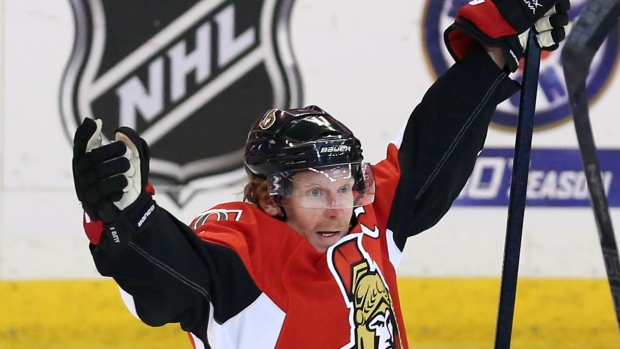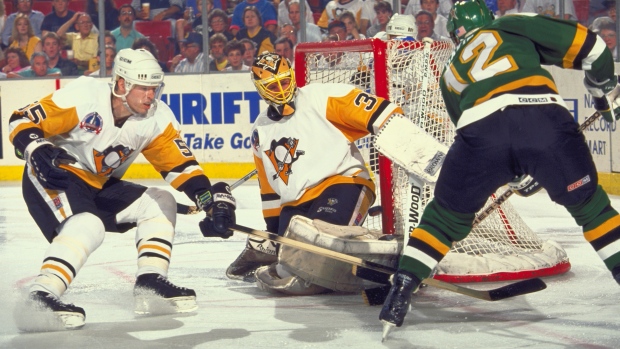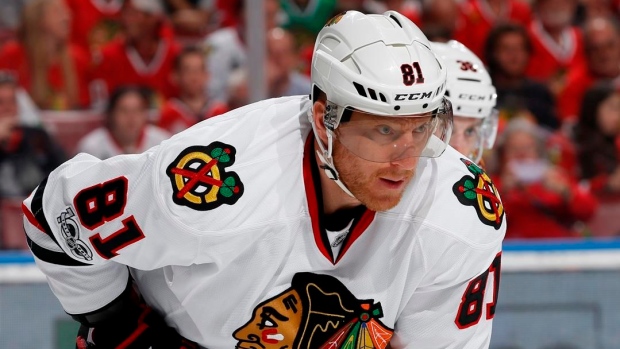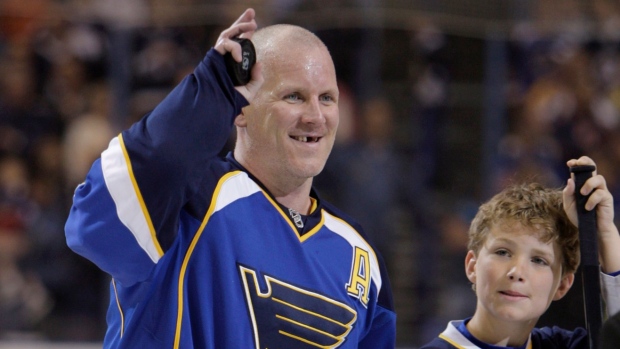Jun 22, 2020
Making eight cases for the Hockey Hall of Fame
If only every Hockey Hall of Fame debate were as straightforward as the one the selection committee faces this week on first-year eligible Jarome Iginla. TSN's Senior Managing Editor of Hockey Steve Dryden makes the cases for eight other former NHL players.
By Steve Dryden

If only every Hockey Hall of Fame decision were as straightforward as the one the selection committee faces Wednesday on first-year eligible Jarome Iginla.
A 600-goal scorer. Three-time first all-star. Two-time Rocket Richard winner. Two-time 50-goal scorer. Two-time Hart runner-up. Two-time Olympic hero. Ted Lindsay winner. Art Ross winner. World Junior superstar.
Quintessential power forward. Ten-year captain. Textbook Hall of Famer.
Apply the rubber stamp.
Some believe that every Hall of Fame debate should be that easy. That if you have to prove someone is a Hall of Famer, then he or she isn’t a Hall of Famer.
If that were so, the Hall of Fame building at the corner of Front and Yonge streets in Toronto would be a lot less crowded.
It would also be missing a lot of great players worthy of hockey immortality.
The Hall of Fame will elect a maximum of four male players, two female players and two builders (or one builder and one referee / linesman) on Wednesday.
Here are the cases for eight former NHL players.
DANIEL ALFREDSSON
(Fourth year of eligibility)

Daniel Alfredsson was the face of the Ottawa Senators’ franchise and its uncontested flag-bearer almost from the moment he earned NHL Rookie of the Year honours in 1995-96. The 14-year Senators’ captain collected 444 goals (63rd all-time) and 1,157 points (54th), plus 100 points in 124 postseason games – among them a sensational 20-game run to the Stanley Cup final in 2006-07. Alfredsson was a two-way force from the beginning to the end of his career – he was a plus player 16 of 18 seasons – but his peak performance years give the best perspective. Using 750 games as a minimum over 13 seasons from 1996-97 through 2009-10, Alfredsson ranked fourth in points per game (1.01) behind only Jaromir Jagr, Joe Sakic and Joe Thornton. He was ahead of Teemu Selanne, Mats Sundin and Paul Kariya. They are all in the Hockey Hall of Fame or, in the case of Jagr, headed there. Alfredsson is already in the IIHF Hall of Fame, so we know the calibre of his international CV – highlighted by five appearances in the Olympic Games and gold in 2006.
Hall of Fame stat: Alfredsson jumps from 54th all-time in actual regular season points (1,157) to 33rd (1,261, 1.01 points per game) in era-adjusted points as calculated by hockeyreference.com. Thirty of the 32 players ahead of Alfredsson are in the Hall of Fame or definitively headed there. The exceptions are Pierre Turgeon (1,315, 1.01) and the still active Patrick Marleau (1,312, 0.76). Six of the seven players who fill out the top 40 behind Alfredsson are in the Hall or headed there.
TOM BARRASSO
(15th year of eligibility)

Tom Barrasso made a big splash when he entered the NHL pool and the ripple effect was felt for years to come. The No. 5 overall draft pick in 1983 was the first goalie to go straight from high school hockey to the NHL. He won the Vezina and Calder Trophies and earned a berth on the first all-star team as an 18-year-old (turning 19 on the second last day of the regular season). Barrasso won the Stanley Cup with Pittsburgh in 1991 and then again in 1992 when he fashioned a record-tying 11-game winning streak as the Penguins eliminated the New York Rangers, Boston and Chicago. Two other goalies have won 11 straight playoff games: Hall of Famers Eddie Belfour and Patrick Roy. Barrasso was the first American goalie to win 300 games and sits 19th (369) on the all-time list. Barrasso’s impact was felt inside and outside the crease. Barrasso never scored a goal but is one of the best puckhandling goalies ever – witness an all-time goalie record 48 assists. He is third all-time in goalie penalty minutes (437) behind Ron Hextall and Battlin’ Billy Smith.
Hall of Fame stats: Barrasso was a one-time Vezina winner and three-time runner-up. Only four goalies have won or been a Vezina runner-up at least four times since the award has been voted on since 1981-82: Dominik Hasek (6 wins, 0 runners-up), Roy (3 and 2) and Marty Brodeur (4 and 3) are in the HHOF. Barrasso (1 and 3) is not. Barrasso was a one-time first all-star and two-time second all-star. Only five goalies have at least three combined first and second all-star berths since 1979-80. Brodeur (3-4-7), Hasek (6-0-6), Roy (4-2-6) and Belfour (2-1-3) are in the HHOF. Barrasso (1-2-3) is not.
THEOREN FLEURY
(12th year of eligibility)

Theoren Fleury’s playing career and life after have featured a string of triumphs, most notably over sexual abuse and addiction. But his wins on the ice are also something to behold. Starting in the late 1980s, Fleury earned a berth on the World Junior Championship all-star team, tied for the Western Hockey League scoring title with eventual Hall of Famer Sakic, made the NHL second all-star team, finished among the top five in voting at right wing three more times, scored 50 goals and earned 100 points twice. Fleury’s brand of hockey left nothing to the imagination: he scored 455 goals (58th all-time) and earned 1,840 penalty minutes. Only four players with at least 450 goals had more penalty minutes: Pat Verbeek, Brendan Shanahan, Keith Tkachuk and Mark Messier. Sitting behind Fleury on this list is Gordie Howe (1,685). Fleury kicked off his pro career by winning the International Hockey League’s Turner Cup in 1988 – contributing 16 points in eight games – and the Stanley Cup with Calgary in 1989. He represented Canada eight times, winning gold at the World Juniors, Canada Cup and Olympics. The final victory of his career would be induction to the Hall of Fame.
Hall of Fame stat: Only 15 players in NHL history have averaged at least one point per game in both the regular season (min. 1,000 games) and playoffs (min. 75 games). Fourteen are in the HHOF: Wayne Gretzky, Phil Esposito, Guy Lafleur, Sakic, Dale Hawerchuk, Bernie Federko, Denis Savard, Jari Kurri, Gil Perreault, Bobby Hull, Paul Coffey, Jean Beliveau, Howe and Messier.
SERGEI GONCHAR
(Third year of eligibility)

Stanley Cup-winning Sergei Gonchar belongs squarely in the Hall of Fame conversation no matter how you calculate career performance. Measured against his direct defenceman peers over the precise length of his career, only Nicklas Lidstrom accumulated more regular-season points (985 to 811). Measured against his all-time peers, Gonchar ranks 16th. The two players directly in front of him – No. 14 Gary Suter (844) and No. 15 Doug Wilson (827) – are the only ones not already in the Hall. (Red Kelly is also listed ahead of Gonchar, but he split his career between defence and forward.) The hard-shooting, two-time 20-goal scorer ranked in the top 10 in defenceman goals and/or points 12 different seasons – including 2001-02 when he led the league with 26 goals. (Gonchar finished first or second in defenceman goals five straight seasons.) As a point of comparison, 2019 inductee Sergei Zubov ranked in the top 10 a total of 10 different seasons. Gonchar reached the Cup final three times and played a pivotal role in the Penguins’ 2009 victory, including timely power-play contributions. That should not come as a surprise. More than half of Gonchar’s career regular season points came with the man advantage. He ranks 10th all-time among defencemen in power-play points (427).
Hall of Fame stat: The two-time second all-star’s regular season production is even more significant when viewed through the prism of era-adjusted points. His 811 points translate to 896, ninth all-time among defencemen, according to hockeyreference.com. Gonchar is the only one among the top 16 defencemen in era- adjusted points not in the Hall.
MARIAN HOSSA
(First year of eligibility)

For all Marian Hossa’s accomplishments during the regular season, they can be overshadowed by his playoff and international records. He is the only player to appear in three consecutive Stanley Cup finals for three different teams (Pittsburgh, Detroit and Chicago), he won three Cups (with Chicago), played in more playoff games (205) than anyone else during the span of his career (1999-2017) and compiled the third most postseason points (149) during that time, behind only Sidney Crosby and Evgeni Malkin. Hossa was a four-time Slovakian Player of the Year and holds his country’s Olympic record for goals (14), assists (14) and points (28). As for the regular season, Hossa’s 525 goals rank 35th all-time and translate to 594 era-adjusted goals, propelling him to 22nd all-time. Twenty of 21 players ahead of him – Marleau being the exception – are in the Hall of Fame or definitively headed there. Seven of the eight players behind him are also in the Hall; Tkachuk is the exception.
Hall of Fame stats: Hossa is one of only six players in NHL history to combine a minimum 15 regular seasons of at least 20 goals and eight postseasons of a minimum 10 points. The other five are in the Hall of Fame or headed there: Gretzky, Messier, Jagr, Brett Hull and Steve Yzerman. The plus-minus statistic has fallen into disregard as a metric for all-around play, but two-way force Hossa is in elite company nonetheless: Hossa was a plus player 17 of his 18 seasons (representing 94 per cent of his career), ranking him with Hall of Famers Larry Robinson (100 per cent), Scott Stevens, Nicklas Lidstrom and Al MacInnis (all at 95 per cent) among the top five in percentage of plus seasons since 1967-68.
KEVIN LOWE
(20th year of eligibility)

If Pro Football Hall of Famer Al Davis made his living in pucks rather than pigskins, Kevin Lowe would have been his kind of player. The man who famously said, “Just win, baby,” would have appreciated Lowe’s record of success. The 18-year NHLer won six Stanley Cups, one Canada Cup and a legion of admirers for the way he played the game – with heart, soul and uncommon fierceness. That he has not been elected to the Hockey Hall of Fame speaks to the difficulty of measuring the contributions of non-offensive defencemen in the pre-analytics era. While Edmonton superstar Paul Coffey was setting all-time records in the offensive zone, Lowe was keeping things tidy in the defensive zone. Not that Lowe – an 86-point scorer in his final junior season and six-time 30-point scorer in the NHL – didn’t have some offensive instincts, but he was a defence-first blueliner. That was his critical contribution to five Cups with the Oilers and one with the New York Rangers. Not since two-time Norris Trophy-winning Rod Langway in 2002 has a defenceman with fewer than Lowe’s 432 career points been named to the Hall of Fame. Langway, Washington’s Secretary of Defence, collected 329 points and won one Cup (with Montreal) over his 15-season career. The Hall of Fame selection committee made something of a statement last year by electing all-time great defensive forward Guy Carbonneau. He was, arguably, the first such choice since Bob Gainey in 1992. That could bode well for Lowe.
Hall of Fame stat: Lowe is tied with Ray Bourque for sixth all-time among defencemen in playoff games (214). Nine of the top 10 are in the Hall of Fame: Chris Chelios, Lidstrom, Stevens, Robinson, Larry Murphy, Bourque, Scott Niedermayer, Coffey and Denis Potvin. All nine accrued significantly more personal honours than Lowe during their careers. Only one of them – Robinson – won as many Cups. The other three defencemen to win exactly six Cups – Doug Harvey, Tom Johnson and Guy Lapointe – are all in the Hall.
ALEXANDER MOGILNY
(12th year of eligibility)

NHL.com senior writer Dan Rosen made a classic Hall of Fame argument for Alexander Mogilny, comparing the trailblazing Russian defector with 2017 Hall of Famer Kariya. Rosen pointed out that Mogilny had more NHL goals (473 to 402) and points (1,032 to 989) than Kariya in almost exactly the same number of games (990 to 989). He also noted that while Mogilny won a Stanley Cup during his 16-year NHL career with Buffalo, Vancouver, New Jersey and Toronto, Kariya didn’t during his 15-year career. And Rosen’s piece de resistance? Mogilny and Kariya each won gold at the World Junior Championship, World Championship and Olympics. We repeat all this because we couldn’t imagine making a better case for Mogilny. The only substantive difference between Mogilny and Kariya are in subjective measures: Mogilny was a two-time second all-star at right wing and one-time Lady Byng winner; Kariya was a five-time all-star at left wing and two-time Byng winner.
Hall of Fame stat: Seven of the 29 members of the Triple Gold Club – winners of World Championship and Olympic gold, plus the Stanley Cup – have scored 1,000 points in the NHL. Five of them are in the Hall of Fame or headed there: Sakic, Shanahan, Jagr, Lidstrom and Sidney Crosby. The exceptions are Mogilny and still active Eric Staal. If you add in the World Junior Championship, Mogilny is a member of the unofficial Quadruple Gold Club. He is one of the all-time greatest World Junior players, collecting 19 goals and 35 points in 20 games.
KEITH TKACHUK
(Eighth year of eligibility)

Tkachuk never won a Stanley Cup or compiled noteworthy playoff numbers (28 goals and 56 points in 89 games), but his regular-season production – in particular his goal-scoring - and menacing physical presence speak to someone who left a mark not just on opponents, but on the game. Tkachuk is one of three players in history, along with Shanahan and Verbeek, to score 500-plus goals and earn 2,000-plus penalty minutes. He had nine 30-goal seasons and 11 seasons of at least 100 penalty minutes. Tkachuk led the NHL in goals (52) in 1996-97 and finished in the top 10 four other times. Tkachuk made two second all-star teams during his career and finished in the top five in left wing voting six more times. His combined eight finishes in the top five at his position rank ahead of every other eligible Hall of Fame candidate – including three-time first all-star and 2020 automatic selection Iginla (seven top five finishes).
Hall of Fame stats: Tkachuk’s 538 goals rank No. 33 on the all-time goal list. Thirty-one of the 32 players ahead of him are in the HHOF or definitively headed there. The one exception is No. 25 Marleau. Nos. 34-36 Frank Mahovlich, Hossa and Bryan Trottier are in the Hall or, in the case of first-year eligible Hossa, given a good shot at making the Hall. Tkachuk’s production stands the test of time: his career 538 goals translate to 584 era-adjusted goals according to hockeyreference.com. That ranks Tkachuk No. 25 all-time. Twenty-three of the 24 players ahead of him are in the Hall of Fame or definitively headed there. Marleau is the exception again. The remaining five members of the top 30 adjusted goal-scorers are also all in the Hall of Fame.


